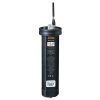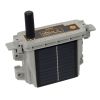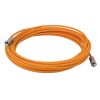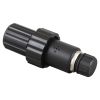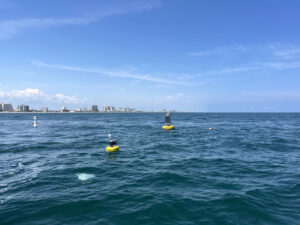Solinst LevelVent 5 Water Level Loggers
The Solinst LevelVent 5 provides instantly accurate water level data without barometric compensation.
Features
- Accurate to +/-0.05% full scale water level data
- 10-year integrated battery based on 1 reading per minute
- Extremely durable vented cable with no desiccants to replace
- Free ground shipping
- Expedited repair and warranty service
- Lifetime technical support
- More
Overview
The Solinst LevelVent 5 provides a highly-accurate datalogger designed to record water level and temperature measurements during shallow groundwater and surface water deployments. The LevelVent 5 logger contains pressure and temperature sensors, a battery, memory for up to 150,000 data logs, and a hydrophobic filter within a 22mm x 173mm (7/8" x 6.8") stainless steel housing with a corrosion-resistant coating.
Sturdy
The LevelVent uses a gauged pressure transducer; it is open to the atmosphere via a vented cable to the wellhead. The compact LevelVent wellhead is designed to fit in a Solinst 2" Well Cap Assembly and provides easy connection for communication accessories. The vented cable and Solinst LevelVent 5 logger are protected from moisture by permanent, built-in desiccants and hydrophobic filters in the logger and the wellhead.
Highly Accurate
The vented pressure transducer is made of Hastelloy, making it extremely durable and accurate in a wide range of temperature and monitoring conditions. The sensor provides an accuracy of 0.05% FS, and can withstand 2 times over-pressure without permanent damage.
In The News
Data-Driven Advocacy on the Lower Deschutes River
Like many freshwater environments, the Deschutes River in Oregon is under pressure from development, pollution, and climate change. Many rivers, streams and lakes in the Deschutes Basin do not meet Oregon water quality standards –where state water quality monitoring assesses levels of bacteria, pH, dissolved oxygen, temperature, and fine sediment. Hannah Camel is the Water Quality Coordinator for the Deschutes River Alliance (DRA), a non-profit organization that focuses on the health of the lower 100 miles of the Deschutes River–the area most affected by human intervention. As a data-driven organization, the DRA has benefited from the installation of two NexSens X2 data loggers.
Read MoreExpanding the Port Everglades: Real-Time Monitoring of Water Quality Conditions from Planned Dredging Operation
The Port Everglades in Broward County, Florida, serves large trade vessels and cruiseliners and incoming and outgoing recreational boaters. However, as cargo ships become larger, the port must expand. A dredging project led by the US Army Corps of Engineers will substantially deepen and widen the port's navigation channel to accommodate larger Panamax cargo ships and modern cruise liners. As a result of this project, a large amount of sediment will be displaced into the water column. This suspended sediment may settle outside of the project area, burying benthic organisms like corals, and possibly carrying harmful particulates to other regions. [caption id="attachment_39497" align="aligncenter" width="2560"] A CB-950 and CB-25 deployed on site at Port Everglades.
Read MoreIt’s Time to React to Water Quality: Proteus Multiparameter Probe aboard NexSens Buoy
Water quality monitoring is essential for safeguarding public health, protecting ecosystems, and ensuring the sustainability of water resources. Contaminants such as industrial pollutants, agricultural runoff, and sewage discharge can severely impact aquatic life and pose serious risks to human health if left unchecked. Traditionally, water quality monitoring has been a slow and labor-intensive process, requiring samples to be collected, transported to a lab, and analyzed—a process that can take days. However, with the advancement of real-time sensor technology, environmental agencies, researchers, and industries can now monitor water quality instantly.
Read More





























